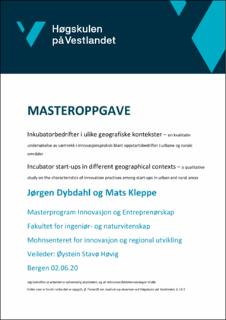| dc.contributor.author | Dybdahl, Jørgen | |
| dc.contributor.author | Kleppe, Mats | |
| dc.date.accessioned | 2020-08-25T06:12:59Z | |
| dc.date.available | 2020-08-25T06:12:59Z | |
| dc.date.issued | 2020 | |
| dc.identifier.uri | https://hdl.handle.net/11250/2673737 | |
| dc.description | Masteroppgave i innovasjon og entrepenørskap, Institutt for økonomi og administrasjon, Høgskulen på Vestlandet, campus Bergen | en_US |
| dc.description.abstract | I denne studien har vi undersøkt hva som kjennetegner innovasjonspraksis i oppstartsbedrifter i urbane og rurale regioner. Vi har også undersøkt hvilke særtrekk inkubatorer har i disse to ulike kontekstene, og om de kan innrettes på en bedre måte for å fange opp ulike særtrekk i innovasjonspraksis i ulike geografiske kontekster. Vi argumenterer for at inkubatorforskning i mindre grad har tatt inn over seg at geografi har en påvirkning på hvordan bedrifter innoverer, og ønsker i denne masteroppgaven å sette fokus på dette. Bakgrunnen for at vi har valgt dette temaet har vært en gryende interesse for inkubatorer og oppstartsbedrifter som sitter i inkubasjon. Vi har vært tilknyttet en urban inkubator det siste året, med en oppstartsbedrift og i inkubatoren observerte vi hvordan ulike bedrifter jobbet og hvordan de benyttet seg av de tjenestene inkubatoren tilbydde dem. Vi har valgt VIS Nyskapingsparken og Industriutvikling Vest AS som case for denne eksplorative innebygde casestudien. For å undersøke hva som kjennetegner innovasjonspraksis hos oppstartsbedrifter, og hvordan inkubatorer er innrettet i disse to ulike kontekstene har vi tatt utgangspunkt i teori rundt inkubatorer samt teori om geografisk variasjon i innovasjonsprosesser. For å vurdere hva som kjennetegner bedriftene og inkubatorene har vi gjennomført intervjuer med ulike personer, rundt deres kunnskap, deres nettverk, deres geografiske tankegang og deres innovasjonsmodus. Vi har i denne studien funnet at særtrekk ved bedrifter i en urban inkubator, er at de har i hovedsak en analytisk kunnskapsbase mot en syntetisk kunnskapsbase i den rurale inkubatoren. Hos den rurale inkubatoren var bedriftene også i større grad knyttet til regionen gjennom kunde/leverandør-forhold. En annen forskjell var at personlige nettverk betydde mer for bedriftenes videre satsing hos den rurale inkubatoren, sammenlignet med den urbane inkubatoren. Et annet funn er at den urbane inkubatoren er tettere tilknyttet akademia og FoU-miljø. Vi avslutter denne oppgaven med å peke på hvilke implikasjoner funnene våre har for teori, samt for utvikling av inkubatorvirkemiddelet. Vi argumenterer for at en inkubator må tilpasse seg etter hvilke innovasjonsbarrierer bedriftene i regionen kan møte, og fokusere på å motvirke disse barrierene i utviklingen av inkubatoren. | en_US |
| dc.description.abstract | In this study we have examined what characterizes innovation practices for start-ups in urban and rural regions. We have also examined what type of characteristics the incubators in these regions have, and whether they can be better aligned to capture different characteristics of innovation practices in different geographical contexts. We argue that incubator research has to a lesser extent assumed that geography has an impact on how companies innovate, which will be the focus in this thesis. The topic is chosen due to a growing interest for incubators and start-ups in incubation. We have also been associated with an urban incubator for the past year, with our own start-up. We observed how different start-ups worked in the incubator and how they used the services the incubator offered them. We have chosen VIS Nyskapingsparken and Industriutvikling Vest as the case for this exploratory embedded case study.
To examine what characterizes innovation practices in start-ups, and how incubators are arranged in these two different contexts, we have based the theory on incubators as well as the theory of geographical variation in innovation processes. To assess what characterizes the start-ups and the incubators, we have conducted interviews with different people about their knowledge base, networks, geographical orientation, and their mode of innovation. In this study, we have found that the characteristics of start-ups in an urban incubator, is that they mainly have an analytical knowledge base, versus a synthetic knowledge base in the rural incubator. In the rural incubators, the start-ups were also more closely linked to the region through customer/supplier relations. Another difference was that personal networks was more important for start-ups in the rural incubator, for their continued commitment, compared to the start-ups in the urban incubator. Another finding is that the urban incubator is more closely associated with academia and R&D environment. Our conclusion in this study, is that our findings can have implications for the incubator theory, as well as for the development of the incubator tool. We argue that an incubator must adapt to the innovation barriers start-ups can face in their region and focus on solving these barriers in their further development. | en_US |
| dc.language.iso | nob | en_US |
| dc.publisher | Høgskulen på Vestlandet | en_US |
| dc.rights | Navngivelse 4.0 Internasjonal | * |
| dc.rights.uri | http://creativecommons.org/licenses/by/4.0/deed.no | * |
| dc.title | Inkubatorbedrifter i ulike geografiske kontekster – en kvalitativ undersøkelse av særtrekk i innovasjonspraksis blant oppstartsbedrifter i urbane og rurale områder | en_US |
| dc.title.alternative | Incubator start-ups in different geographical contexts – a qualitative study on the characteristics of innovation practises among start-ups in urban and rural areas | en_US |
| dc.type | Master thesis | en_US |
| dc.description.localcode | INN599 | en_US |

